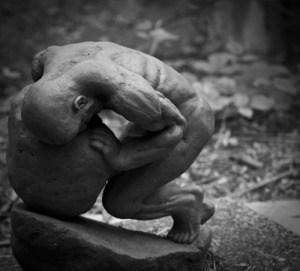In The Myth of Sisyphus, Albert Camus retells the ancient Greek tale of the king Sisyphus who was condemned to forever push a boulder up a mountain, only to see it roll down again. Despite an eternity of “futile labor”, in the end Camus concludes “One must imagine Sisyphus happy.” Camus suggests that Sisyphus would adapt to his fate. He would, as if running on a hedonic treadmill, get used to the constant push skyward and return. There would be no stress.
But “happiness” is more than that. Using the term loosely to include flourishing, well-being, life satisfaction and the sort, I also believe Sisyphus could have been happy. The futile labor imposed by the gods could even have been a source of deep and significant meaning.
Seligman has his formula for what it means to flourish, PERMA: positive emotion; engagement; positive relationships; meaning and accomplishment. While this model may or may not be complete, it is efficient and useful in helping us order things.
Positive Emotion? Sisyphus certainly could have had those. Engagement? It is easy to place all your focus and concentrated energy into the boulders we have to move. Accomplishment? Every day Sisyphus crested a mountaintop. Relationships, the granddaddy of well-being? If the gods meant to punish, then this may have been Sisyphus’ hell. Sisyphus, it seems, was alone for all of eternity.
But what about meaning? Despite what the Greeks said, notwithstanding the god’s intent and contrary to Camus’ conclusion about the beautiful absurd, Sisyphus is the metaphor for our purpose on earth.
Of course Sisyphus is all of us. In the office I work through the stack of papers on my desk only to come back tomorrow to a still larger mound. I return home again and the same dishes I cleaned last night are piled in the same sink. The laundry is spilling out from the basket we only just emptied. The bills flow-in in an endless stream disproving all laws against perpetual motion. Even the cells of my body divide and replicate over again-and-again, year-after-year, until some enzyme inserts the wrong nucleotide or too many or too few into a sequence causing a cascade of mutation, cancer and decay.
And Sisyphus, it could even be said, was showing us the path to meaning.
There was never any punishment in that ancient myth. Every man and demigod that the deities left alone without a stone, have the very same burden and fate. Leaves fall from the trees. Over time, disorder increases in every system. The world simply goes about unbuttoning itself again-and-again. Maybe it is our job upon the earth to put the pieces back together in our little time and our little place. Maybe when we look around us and see so many people suffering with their stone, whatever it may be, perhaps our job is to make their lives a little bit better. To lend them a shoulder and help them push their rock to the top of the mountain and watch it crash to the earth together. Maybe if there were a god or gods, they would need us with our free will to continually make the world fresh and new and worth the perpetual labor and climb.
<Thanks to buckaorg (Paul Burnett) and quin.anya (Quinn Dombrowski) for generously making their image and text of Sisyphus available via a Creative Commons license.>








Awesome, Sean!
Thanks David!
Sean! Very well-conceived and very well-written. Thank you!
Thanks Rob! Glad you enjoyed it.
So many things come to mind – laundry, cleaning, meal preparation…. Somehow all of my Sisyphean tasks are housework related. The repetition at work doesn’t seem to bug me so much. I think I need a housewife… 🙂 But I don’t see the meaning in those tasks – they only seem like drudgery. Perhaps if I saw the meaning, they would seem less dull? And yet, that seems like an awful lot of effort and self-convincing for something that’s so small. Sometimes I feel that perhaps we are better off not to care rather than to make something of it. I wonder if Sisyphus just stopped caring and focused on more important things, like his own thoughts and feelings and inner creativity. That might have been more meaningful to him during his punishment. More like Frankl?
Lisa, I don’t think everything we do needs to be meaningful. Causal chains end everyday without them leading to happiness, meaning or anything else. But there is also nothing wrong with our just doing the things we need to do to maintain life. (just don’t let all of life become nothing but a series of “to dos”!). In a sense, all of life becomes a metaphor. Things keep falling to pieces again and again and our job is to keep picking them up, and putting them together all over again. We are needed to make the world a better place.
Very nice, Sean.
Thanks Geoff! I knew you would like it
Re-posted. I will now think of Sisyphus as happy. A shift in my perspective. Love how you utilized PERMA in your post. Mindfulness and Ellen Langer come to mind, “How can I?” not “Can I?” Many thanks, Sean.
Thanks Judy! I had actually used this an a final exam question for my students in my Positive Psychology class at NC State University one year. “Drawing on what we studied this year, how could Sisyphus be happy?”